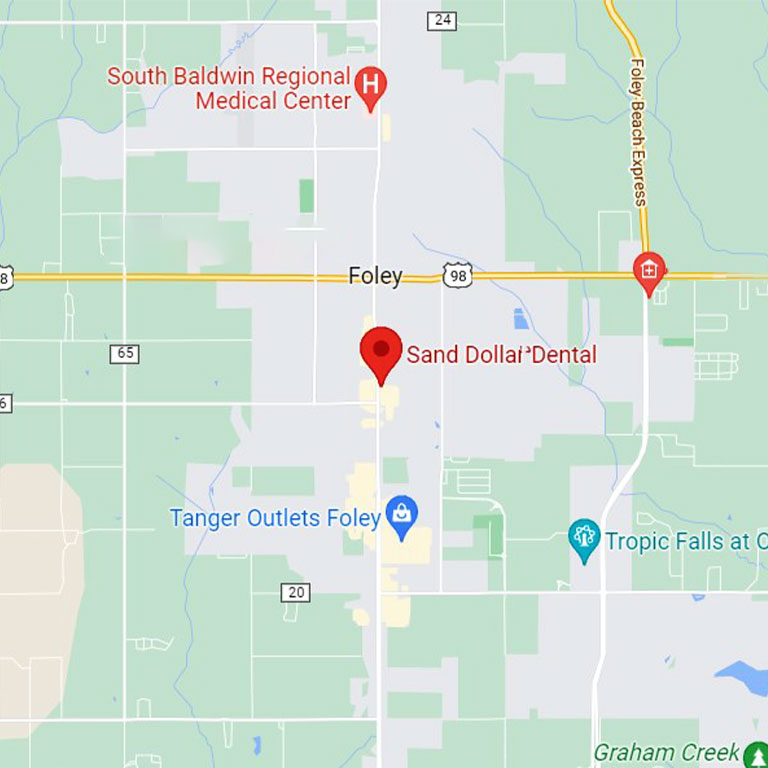Teeth Bonding in Foley, AL
Are you looking for a dentist in Foley, AL that performs dental restorations? If so, you might also want more information about the process first. Therefore, we are going to go over teeth bonding, including the tooth bonding process, the benefits of tooth bonding, and more.
What Is Teeth Bonding?
Teeth bonding is also referred to as tooth bonding or dental bonding, but they all mean the same thing. Teeth bonding is a cosmetic dental procedure that is used to repair and restore cracked, chipped, or broken teeth. Teeth bonding is also used to fill gaps between teeth and even to correct discolored teeth.
What Is the Process for Teeth Bonding?
There are different types of tooth bonding and they include direct composite bonding and adhesive bonding.
Direct Composite Bonding
Direct composite bonding involves applying a tooth-colored composite resin to your teeth to repair or restore your original teeth. Most teeth bonding procedures don’t require anesthesia and can usually be completed in just one visit.
The dentist will use a tooth color guide to match the bonded tooth/teeth with your natural teeth. The dentist will then roughen the tooth’s surface then apply a dental compound to it that will make the bonding agent stick.
Next, the dentist will apply a composite resin to the teeth that were just prepared for the bonding process. That resin will then be shaped and completed by using ultraviolet light to cure it. Once the resin hardens, the dentist will shape it until it looks smooth and natural.
To finish the process, the dentist will apply a finishing agent to your teeth/tooth. This step is done to help keep the bonded resin from coming loose or causing tooth sensitivity.
This entire process only takes about 30-60 minutes or so. However, it could take longer depending on the severity or the number of teeth that are involved.
Adhesive Bonding
Sometimes, with adhesive bonding, a local anesthetic might be used depending on how extensive your treatment needs are. Adhesive bonding requires the dentist to attach the dental restoration to your tooth using an etching and bonding agent. Then an adhesive will be applied and cured using a high-powered curing light.
This method is used for aesthetic purposes and for metal-free crowns, onlays, inlays, porcelain veneers, bridges, and fillings.
The dentist will begin by isolating your tooth using a rubber dam to help keep the moisture out. And, if needed, the dentist might trim down the existing tooth to make room for the dental restoration. The tooth’s surface will then be etched with a phosphoric acid mixture. Then the dentist will apply an adhesive to the restoration, place it on the existing tooth, then cure that restoration with a UV light which will harden it and bond them together.
The Benefits of Teeth Bonding
There are lots of benefits of teeth bonding in Foley, AL and the benefits might differ from person to person. But here are the most common benefits of teeth bonding.
- Improved dental health
- Better dental protection
- Better appearance and smile
- Whitens stained teeth
- Improved tooth shape and size
- Improved tooth function
- Fixes chipped, cracked, or broken teeth
- Fills large gaps in teeth
Are There Any Risks Associated with Teeth Bonding?
Dental teeth bonding in Foley, AL is considered a safe, outpatient procedure. Therefore, there are no risks involved.
How Do You Care for Bonded Teeth?
Bonded teeth are strong; however, there are some things you should avoid such as chewing on things like ice, pens, hard candies, biting your nails, etc. But fortunately, bonded teeth are easy to care for. You simply practice good oral hygiene. You should also limit the number of drinks and other things that could stain your teeth, such as coffee, tea, wine, tobacco, and other foods and drinks that are notorious for staining teeth. And, always visit your dentist in Foley, AL every six months for a professional cleaning and dental exam.


